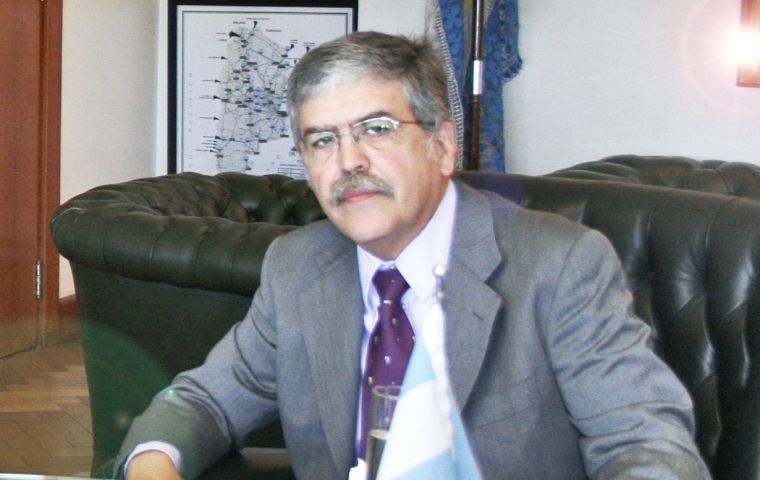MercoPress. South Atlantic News Agency
Argentina warns Barrick on announced suspension of gold mine project
 De Vido: “We won’t allow any speculations by companies regarding market conditions. They have to fulfill their investment obligations”
De Vido: “We won’t allow any speculations by companies regarding market conditions. They have to fulfill their investment obligations” Barrick, the world’s largest gold mining company, is indefinitely suspending construction of its troubled gold mine straddling the Chile-Argentine border, part of a cost-cutting effort that also involves 10 other mining projects around the world.
However in Argentina Planning Minister Julio De Vido insisted the company would continue with the project and demanded Barrick “fulfill its investment obligations” and “guarantee jobs” otherwise it risks losing the concession. Pascua-Lama, which Barrick has been counting on to provide a large share of its future gold production, has been plagued by political opposition, permitting issues, labor unrest, cost-overruns and a sharp drop in bullion prices. Even so, Barrick had signaled that it intended to keep plowing ahead with the remote project, which straddles the border of Chile and Argentina high in the Andes, a location that has bumped up costs and fuelled environmental opposition. The Toronto-based company stressed that the decision to stop development was not the end of the road for Pascua-Lama. Barrick said it would resume construction when conditions warranted, and would explore strategic partnerships or royalty and similar deals to fund the project. “The project has been, and continues to be, a top priority for the company, and also our biggest challenge,” Chief Executive Jamie Sokalsky said during a call with analysts and investors. In the Argentine province of San Juan, the head of Barrick Argentina Guillermo Calo and Deputy Governor Sergio Uñac assured the continuity of the project in the province and insisted jobs would be preserved. “There’s a rumor that we are going to cancel the project but that’s not the company’s intent,” Calo said. “Since the mine is mainly located in Chile and we cannot currently operate there, it’s going to take several months to reach the mineral. That implies longer times to develop the project and increasing costs.” Uñac guaranteed the government is making “all the efforts necessary” to guarantee the project’s continuity “when the international conditions of the mining sector improve.“ Along those same lines, Argentine Planning Minister De Vido said the problems in Chile complicated the project” and asked Barrick “to work as it’s supposed to keep people’s jobs.” De Vido said Barrick did not have a lot of time to make up its mind. It has to either develop the mine as scheduled or risk losing the concession. “Mine sites are assets of a company as long as they make the necessary investments to produce,” De Vido said. “We won’t allow any speculations by companies regarding market conditions. They have to fulfill their investment obligations.” Pascua-Lama is expected to produce up to 850,000 ounces of gold annually in its first five years, and at exceptionally low operating costs, which could pay dividends for years to come. Barrick announced its decision on Pascua-Lama as it reported third-quarter earnings that topped expectations, helped in part by lower operating costs. Still, earnings and revenue tumbled from a year earlier. The decision to suspend construction is a blow to Argentina’s President Cristina Fernández. Pascua-Lama is the main foreign investment project in Argentina after Brazil’s Vale halted a 6 billion dollars potash project at the beginning of the year due to high costs. And it is another disappointment for Chile’s mining sector, which faces regulatory delays and increasing opposition from local communities and environmental groups. Barrick had been expected to raise its estimate of the cost of Pascua-Lama — which it pegged last year at as much as 8.5 billion — when it announced quarterly results, but it did not give a new figure. Problems with permits had been expected to raise the mine’s price tag. Regulators halted construction on the Chilean side of the border last spring, citing serious environmental violations, with Barrick agreeing to build a new water management system.




Top Comments
Disclaimer & comment rules-

-

-

Read all commentsRepsol repeat coming up?
Nov 01st, 2013 - 09:51 pm 0Paragraphs anyone?
Nov 01st, 2013 - 11:12 pm 0These guys are simply fresh (De Vido), bother Uruguay for increase the activity of the pulp mill and want to continue with the polluting project Pascua Lama.
Nov 02nd, 2013 - 12:53 am 0Pascua Lama was halted in Chile since is polluting glaciers and water streams. It will be kept that way until the issue will be solved.
Commenting for this story is now closed.
If you have a Facebook account, become a fan and comment on our Facebook Page!